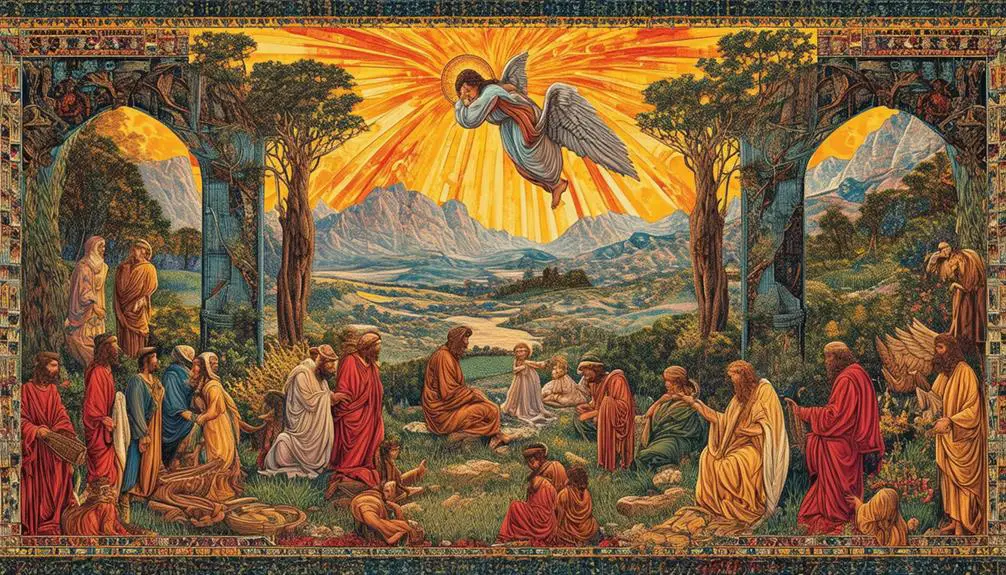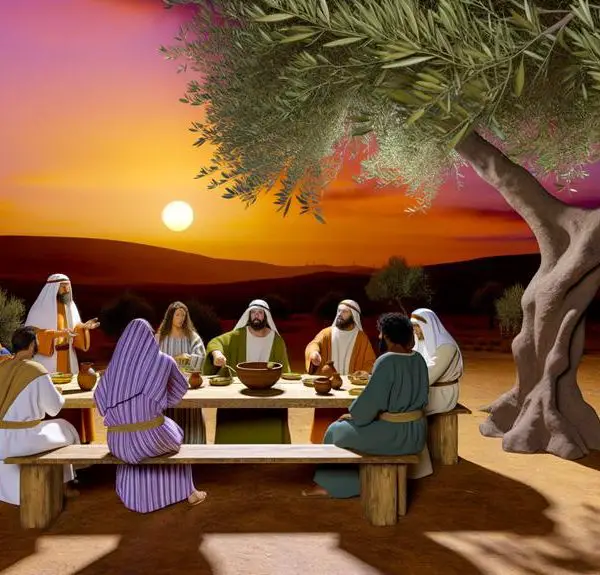Peek into Genesis Chapter 16, where Sarai's infertility, Hagar's flight, and divine intervention form a riveting narrative, promising profound enlightenment.

Bible Study – The Book of Genesis – Chapter 16 – Summary and Analysis
In Genesis Chapter 16, Sarai, Abram's wife, gives her handmaid Hagar to Abram due to her infertility. Hagar's subsequent pregnancy incites conflict, leading to her flight into the desert, where she encounters an angel who reassures her of God's providence and promise. This chapter encapsulates divine intervention, reflects societal norms of the time, and foretells the growth of Israel. Ishmael, Hagar's son, emerges as an essential link to Abram's lineage. By examining the cultural context and symbolism, you'll perceive deeper truths and gain a nuanced understanding of this chapter's intricate narrative. The path for further enlightenment unfurls ahead.
Key Takeaways
- Genesis Chapter 16 explores themes of divine intervention, faithful obedience, and the manifestation of God's promises.
- The chapter describes key characters Sarai, Abram, and Hagar, and their transformation through choices and divine intervention.
- This chapter marks the birth of Ishmael, progenitor of Arab tribes, as a strategic move for Abram's lineage.
- The narrative intricacies involve cultural implications, societal norms, symbolism in names, and divine-human interaction.
- Analysis and interpretation of the chapter reveal the interplay of divine and human agency, the compassionate nature of God, and the symbolism in naming.
Chapter 16 – Brief Overview

Delving into Genesis Chapter 16, you'll uncover a pivotal narrative in the Bible, rich with symbolic implications and intriguing characters, which warrants your meticulous exploration. This chapter chronicles Hagar's story, an Egyptian handmaid, and the birth of Ishmael, set against a backdrop of familial conflict. Genesis Symbolism is deeply ingrained here, as Hagar's flight to the wilderness symbolizes a journey of faith.
One must consider the Cultural Context of this narrative. Ancient Near Eastern customs allowed for a barren wife to provide her handmaid to her husband for the purpose of bearing children. Hence, Sarai's offer of Hagar to Abram was not unusual. However, the subsequent tension between Sarai and Hagar was a manifestation of the complex social dynamics of the time.
In terms of symbolism, the Angel's declaration to Hagar, 'I will so greatly multiply your offspring that they cannot be counted for multitude' (Genesis 16:10), may be seen as a foreshadowing of Israel's future growth. It's an affirmation of the enduring theme of God's providence and promise.
Thus, Genesis 16 presents a deeply textured narrative, infused with cultural and symbolic nuances that await your careful examination.
Main Characters Highlighted
In this chapter, you'll encounter a cast of key characters, each entangled in the unfolding drama and imbued with symbolic significance. Sarai, frustrated by her inability to conceive, allows her maidservant Hagar to bear Abram's child. Her decision not only reflects her desperation but also signifies a pivotal moment in her character evolution.
Abram, who complies with Sarai's plan despite its critical ambiguity, exhibits a notable shift in his character, straying from his righteous path. Hagar, the Egyptian maidservant, becomes an unwilling participant in their plan, her character illustrating the plight of the powerless in society.
Divine intervention plays an important role in these characters' lives. When Hagar flees due to Sarai's harsh treatment, an angel of God appears to her, foretelling the birth of her son, Ishmael. This encounter emphasizes the theme of divine intervention, underscoring the belief that God's plan extends to all, even the marginalized.
This chapter provides a profound exploration of character evolution, influenced by personal choices and divine intervention. The characters' actions and the consequent repercussions create a complex tapestry of human experiences, inviting you to explore deeper into their motivations, dilemmas, and transformations.
Key Events Summarized

Let's turn our attention to the pivotal events that shape Genesis Chapter 16. Keep in mind the significant moments such as Hagar's encounter with an angel, the ensuing conflict between Sarai and Abram, and the consequential birth of Ishmael. Your understanding of these key instances will be pivotal in comprehending the narrative's broader themes and implications.
Hagar's Encounter With Angel
Exploring through Genesis chapter 16, you'll encounter a pivotal moment where Hagar, Sarai's maid, has a profound interaction with an angel. This exchange not only illuminates Hagar's faith but also delivers a significant prophecy.
- The angel finds Hagar near a spring in the desert, symbolizing her isolation and desperation.
- Hagar is commanded to return to Sarai, a directive demonstrating her unwavering faith.
- The Angel's prophecy foretells the birth of Hagar's son, Ishmael, and the numerous descendants to follow.
This episode is a confirmation of Hagar's faith, her obedience to divine instructions, and her courage to face her difficult circumstances. The Angel's prophecy, intertwined with Hagar's faith, sets an important trajectory for the narrative's progression, emphasizing the divine plan working behind human actions.
Sarai and Abram's Conflict
While you may be drawn to the exchange between Hagar and the angel, it's important not to overlook the escalating conflict between Sarai and Abram, which plays a significant role in the narrative's unfolding. Sarai's resentment towards Hagar becomes palpable, a reaction to her own barrenness and the threat Hagar's potential offspring present to her status. She blames Abram, illustrating the strain their predicament places on their relationship. Abram's decision to allow Sarai to deal with Hagar as she sees fit further complicates matters. His passivity indicates his struggle in managing his obligations towards his wife and his concubine. This interplay of resentment and decision-making exposes the characters' humanity, and their wrestling with the promises and provisions of God.
Birth of Ishmael
In the heart of Genesis 16, you'll find the significant event of Ishmael's birth, a turning point that introduces a new dynamic into Abram and Sarai's strained relationship.
To better understand this pivotal moment, let's consider the following:
- Ishmael, born of Hagar, Abram's maid, was not just the product of Sarai's inability to conceive. His birth was a strategic move, a desperate attempt to maintain Abram's lineage.
- Ishmael's Legacy is marked by his distinction as the progenitor of numerous Arab tribes, fulfilling God's promise to Abram of countless descendants.
- The Arab Lineage stemming from Ishmael has deep historical implications, shaping the landscape of Middle Eastern conflict and alliances.
Thus, Ishmael's birth is not just a key event but a catalyst that sets in motion significant biblical narratives.
Unfolding of Major Themes

In Genesis 16, you'll notice significant themes unfolding such as Abram and Sarai's impatience, Hagar's plight and her divine revelation, and the manifestation of God's promise. Carefully scrutinize these themes as they will not only deepen your understanding of this narrative but also its implications for broader biblical theology. Pay close attention to how these themes interact and build upon each other, contributing to the complexity and richness of Genesis 16.
Abram and Sarais Impatience
Despite God's assurance of a fruitful lineage, Abram and Sarai's impatience becomes a central theme in Genesis Chapter 16, leading them to take matters into their own hands rather than waiting on divine timing. This impatience results in significant consequences, forever changing the trajectory of their family's story.
- Abram and Sarai's decision to use Hagar as a surrogate results from their lack of faith in God's promise and impatience for the fulfillment of His word.
- Their action triggers a series of unfortunate events, including internal family conflict and discord.
- It also illustrates the human tendency to rush God's divine timing, often leading to unanticipated consequences and complications.
Hagars Plight and Revelation
Through Hagar's plight and revelation, you'll uncover major themes that permeate Genesis Chapter 16, illustrating the profound effects of Abram and Sarai's impatience on her life. Hagar's desert survival is a proof of her strength and resilience. Despite being harshly treated and cast out, she survives in the wilderness, a feat that underscores her character and the recurring theme of human endurance in Genesis. Additionally, the angelic intervention she experiences is a pivotal moment. It's not just a divine rescue, but a revelation that God sees and responds to human suffering. This encounter also presents a divine promise that her descendants will be numerous, a theme that underpins much of Genesis. Hagar's story, therefore, becomes a lens through which we can explore these key themes.
Manifestation of Gods Promise
Pivoting from Hagar's personal revelations, let's now turn our attention to the broader narrative of God's promise and its manifestation, which is a major theme interwoven throughout Genesis Chapter 16. This chapter vividly portrays the unfolding of God's promise through:
- Divine Intervention: God's direct involvement in human affairs, as seen when He promises Hagar a son and a multitude of descendants.
- Faithful Obedience: Abram and Sarai's unwavering trust in God's word, despite the seemingly impossible circumstances.
- The Birth of Ishmael: A tangible proof of God's promise coming to fruition.
Through these events, Genesis 16 illustrates that God's promises are not idle words. Instead, they're powerful assurances that require faith and patience, but ultimately lead to manifestation.
Intricacies in the Narrative

Delving into the narrative of Genesis Chapter 16, you'll encounter a rich tapestry of intricacies that reveal profound truths and complexities within the story. The cultural implications are deeply woven into the narrative, illustrating the societal norms and values of the time. The treatment of Hagar, for instance, is indicative of the cultural practices concerning bondwomen and their relationship with their masters.
The narrative symbolism, too, is striking. The desert, often symbolic of hardship and isolation, becomes a place of divine intervention and revelation for Hagar. Water, a symbol of life and fertility, also features prominently, foreshadowing the birth of Ishmael and his descendants.
The dialogue between God and Hagar is another intricate layer of the narrative. It's a poignant instance of divine-human interaction, revealing God's concern for the oppressed and marginalized. The naming of Ishmael, which means 'God hears', further underscores this theme.
Each aspect of the narrative is intricately connected and serves to deepen our understanding of the biblical text. These subtleties in the narrative structure and symbolism, and their cultural implications, contribute to a rich, complex and profound understanding of Genesis Chapter 16.
Analysis of Chapter 16
Having examined the narrative's intricacies, let's now turn our attention to a detailed analysis of Genesis Chapter 16. This chapter offers us a fascinating exploration of cultural context and symbolism significance within the Biblical narrative.
- Cultural Context Exploration: The story of Sarai, Abram, and Hagar reflects the societal norms of the time. Sarai's inability to conceive and her subsequent decision to offer her maid Hagar as a surrogate is indicative of the cultural and social pressures of their era.
- Symbolism Significance: The names and roles of the characters themselves carry symbolic weight. Abram, meaning 'exalted father', changes to Abraham, 'father of many'. Hagar, 'stranger', embodies her position as an outsider.
- Interplay of Divine and Human Agency: Chapter 16 also highlights the complex interplay between divine intervention and human agency. God's promise to Abram and the subsequent actions taken by Sarai and Abram to fulfill this promise demonstrate this interplay.
Interpreting Significant Verses

Let's now examine some significant verses in Genesis Chapter 16, each one a gem revealing deeper layers of meaning and context within this compelling narrative.
Firstly, the Divine Intervention in the story of Hagar, Abraham's maidservant, is deeply significant. As Hagar fled from Sarai's harsh treatment, an angel of the Lord found her by a spring in the wilderness (Genesis 16:7). Here, God intervened, providing guidance and assurance to an oppressed and desperate woman. This highlights God's compassion, and his willingness to intervene in human affairs, even in the most desperate situations.
In Genesis 16:11, we see the use of Symbolic Names. The angel tells Hagar, 'You shall name him Ishmael.' The name 'Ishmael' means 'God hears' in Hebrew, symbolizing God's attentiveness to Hagar's plight. This act of naming signifies God's active involvement in human life and reinforces his compassionate nature.
Reflections on Chapter Lessons
Reflecting on the lessons of Genesis Chapter 16, you'll find that it offers profound insights into the nature of divine intervention, the power of symbolic naming, and the empathetic character of God.
Firstly, the divine intervention demonstrated in this chapter serves as a reminder of God's active participation in our lives. It's not passive; it's about guidance and instruction for spiritual growth. Additionally, the power of symbolic naming is illustrated through Hagar's naming of God as 'The God who sees me.' This signifies a personal and intimate relationship with the divine.
- Divine intervention isn't just about miracles; it's about guidance, instruction, and spiritual growth.
- Biblical symbolism, such as Hagar's naming of God, allows us to perceive deeper spiritual truths.
- The empathetic character of God, as depicted through His interaction with Hagar, underscores His compassion and understanding of human suffering.
Frequently Asked Questions
What Cultural Context Influenced the Events in Genesis Chapter 16?
You have to take into account the patriarchal society and ancient customs that were prevalent back then. These influenced the events in Genesis Chapter 16. Women were seen as property and their main role was to bear children. If they couldn't, their maids were often used as surrogates. Imagine that! It's a stark contrast to today's norms, but it was the cultural context of that time. It deeply shaped the narrative and the characters' actions.
How Does This Chapter Relate to the Overall Message of the Bible?
In Genesis 16, you'll find its importance lies in the unfolding of God's promise to Abraham. This chapter's message interpretation links to the Bible's overarching theme of faith and obedience to God's word. Even when situations seem hopeless, you're reminded that God's promises persist. It's a vital part of the Bible's narrative, showcasing how individual actions can greatly impact God's divine plan.
Are There Any Archaeological Evidences That Support Events in Genesis 16?
While there's no specific archaeological evidence directly supporting Genesis 16, you've got to remember, it's a tale of Abraham's leadership and Hagar's faith, key themes throughout biblical history. Most archaeological finds relate broadly to biblical times, not specific events. So, while you won't find a 'Hagar was here' inscription, the historical contexts and societies described in Genesis are supported by archaeological findings. It's a matter of faith and interpretation.
How Does Genesis 16 Influence Christian Practices Today?
You might view Genesis 16's tale of Sarai's impatience and Abram's compliance as a reminder to trust in God's timing. It's often cited in discussions about faith and patience within Christian practices. It's used to caution against taking matters into our own hands when God's plan seems slow. This chapter reinforces the idea of complete trust in God and obedience to His will, shaping how Christians act and make decisions today.
What Are Other Religions Interpretations of the Events in Genesis Chapter 16?
From an Islamic perspective, you'd find Genesis 16's events reflected in the story of Hagar and Ishmael. They're highly revered figures in Islam. The Jewish interpretation, on the other hand, focuses more on Sarah's struggle and Abraham's compliance with her demands. You'd notice a common thread of faith, obedience, and the sovereignty of God in both interpretations, despite the distinct perspectives each religion offers.



Sign up